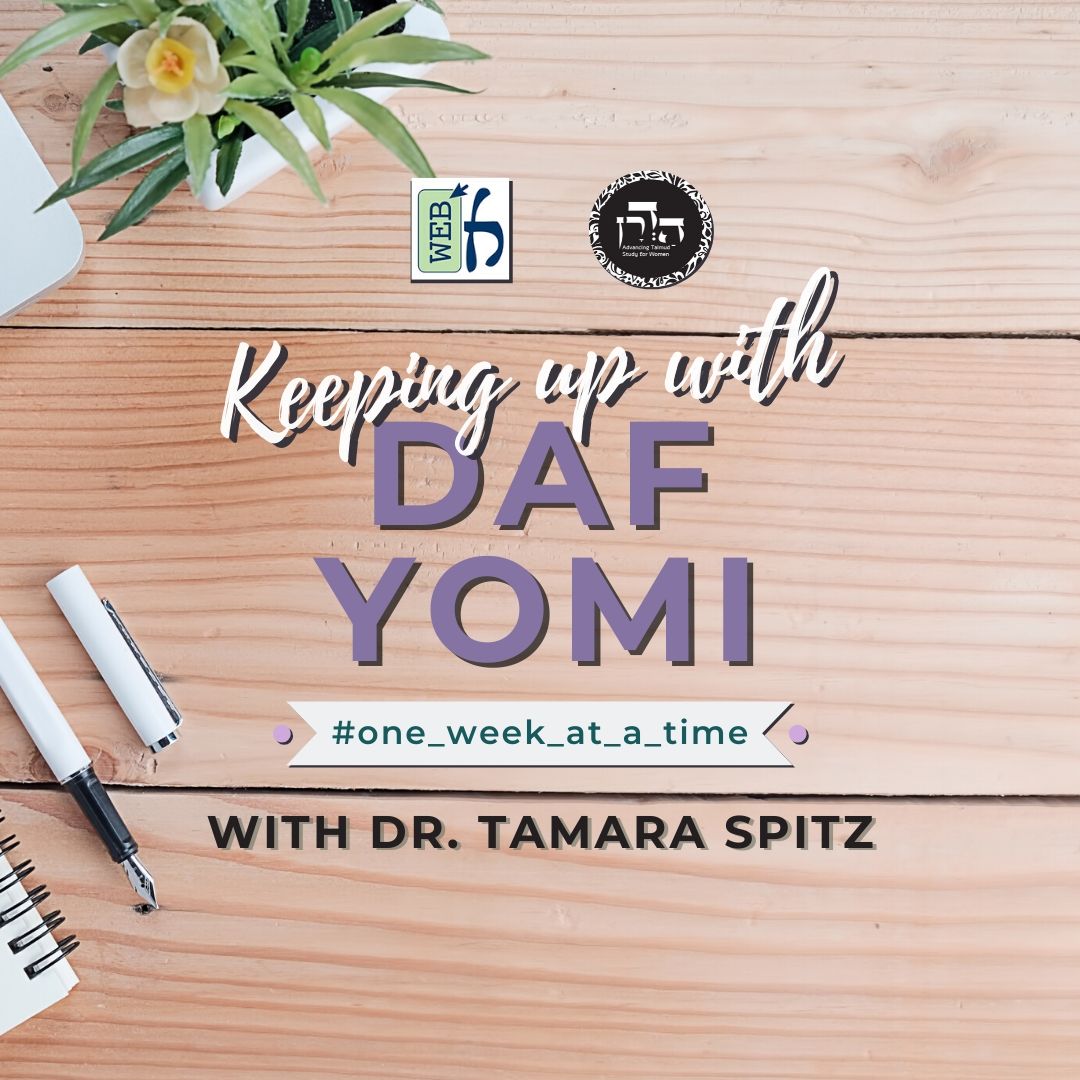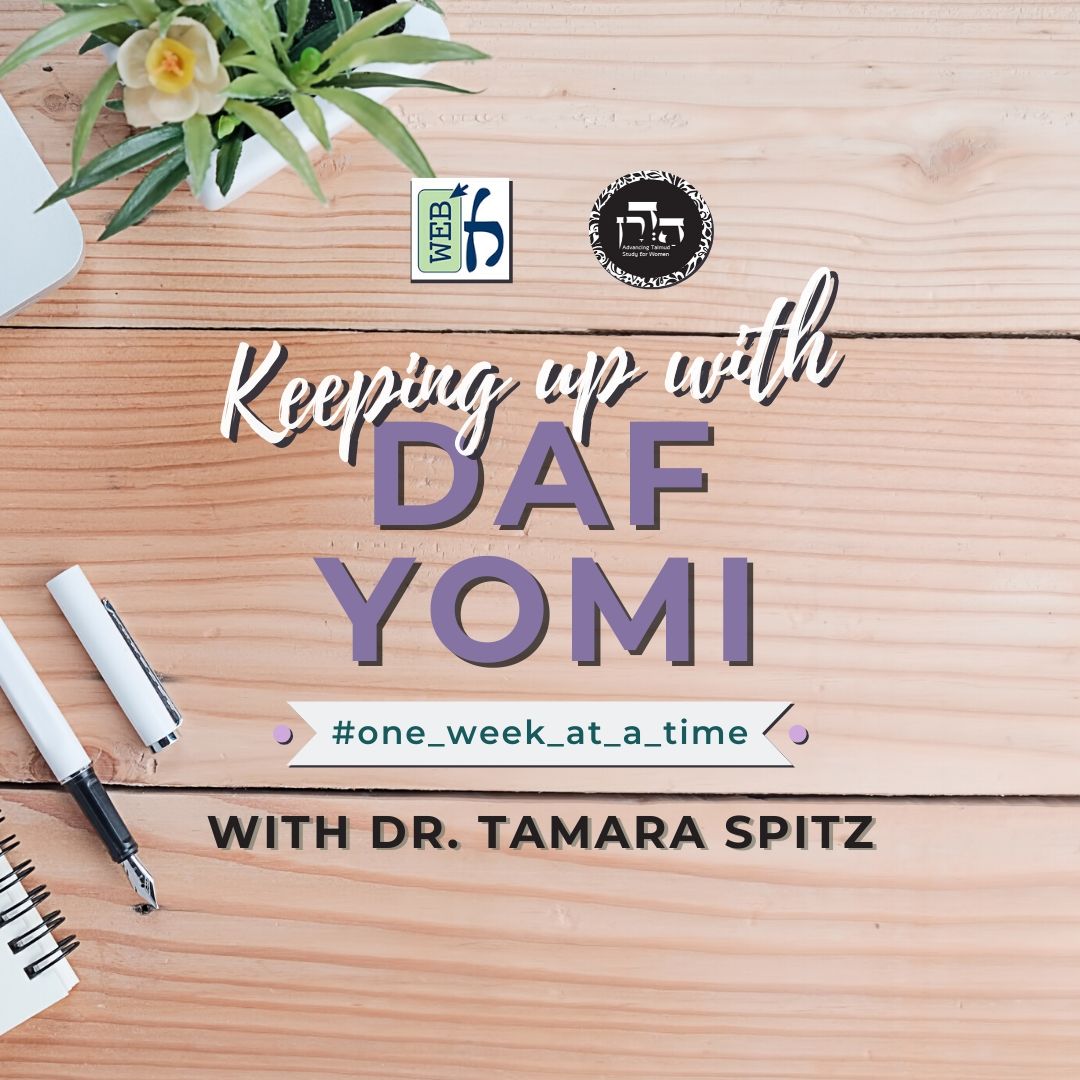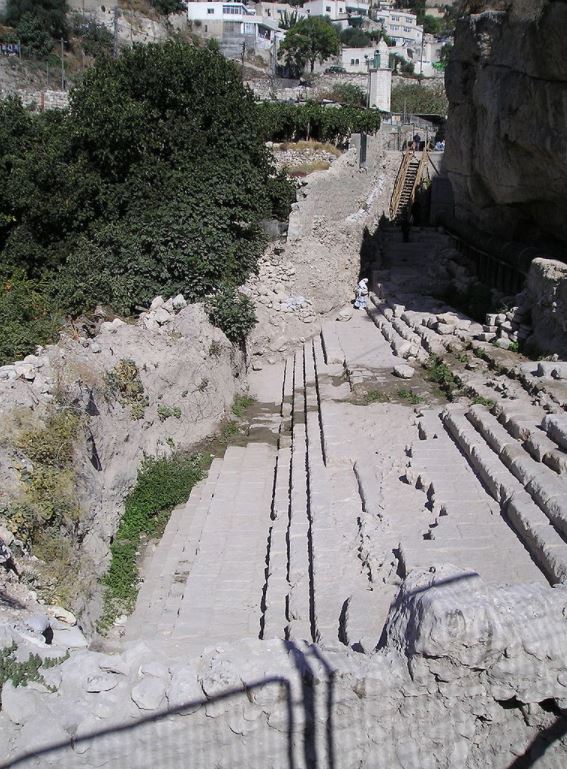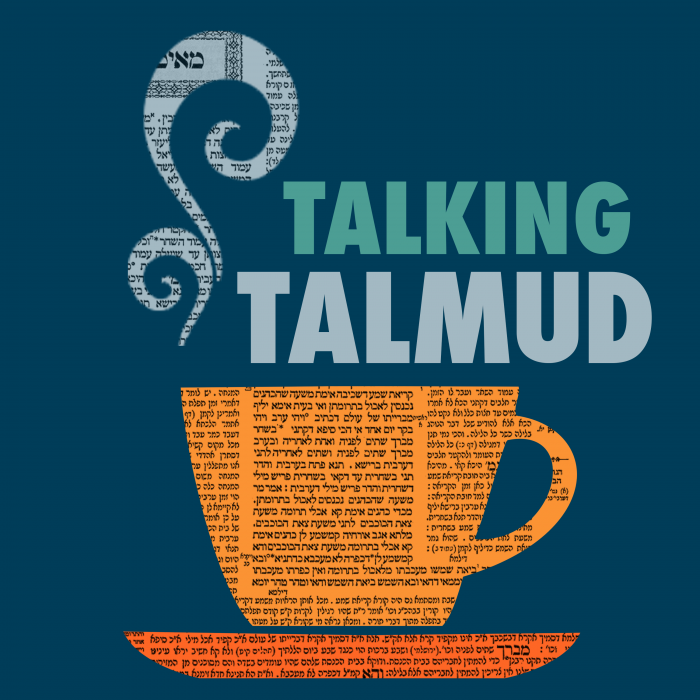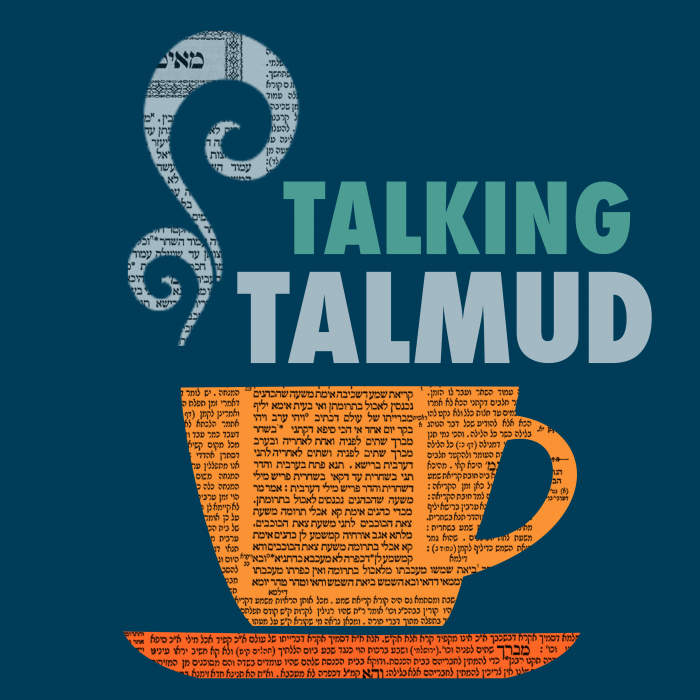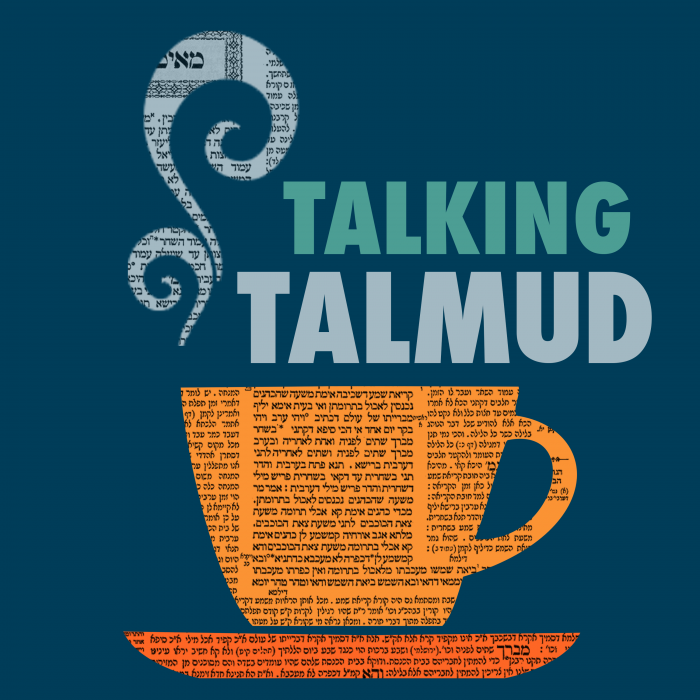Sukkah 52
״וְסָפְדָה הָאָרֶץ מִשְׁפָּחוֹת מִשְׁפָּחוֹת לְבָד מִשְׁפַּחַת בֵּית דָּוִד לְבָד וּנְשֵׁיהֶם לְבָד״. אָמְרוּ: וַהֲלֹא דְּבָרִים קַל וָחוֹמֶר: וּמָה לֶעָתִיד לָבֹא, שֶׁעוֹסְקִין בְּהֶסְפֵּד וְאֵין יֵצֶר הָרָע שׁוֹלֵט בָּהֶם — אָמְרָה תּוֹרָה אֲנָשִׁים לְבַד וְנָשִׁים לְבַד. עַכְשָׁיו, שֶׁעֲסוּקִין בְּשִׂמְחָה וְיֵצֶר הָרָע שׁוֹלֵט בָּהֶם — עַל אַחַת כַּמָּה וְכַמָּה.
It is stated: “The land will eulogize, each family separately; the family of the house of David separately, and their women separately, the family of the house of Nathan separately, and their women separately” (Zechariah 12:12). This indicates that at the end of days a great eulogy will be organized during which men and women will be separate. They said: And are these matters not inferred a fortiori? If in the future, at the end of days referred to in this prophecy, when people are involved in a great eulogy and consequently the evil inclination does not dominate them, as typically during mourning inappropriate thoughts and conduct are less likely, and nevertheless the Torah says: Men separately and women separately; then now that they are involved in the Celebration of the Drawing of the Water, and as such the evil inclination dominates them, since celebration lends itself to levity, all the more so should men and women be separate.
הָא הֶסְפֵּידָא מַאי עֲבִידְתֵּיהּ? פְּלִיגִי בַּהּ רַבִּי דּוֹסָא וְרַבָּנַן. חַד אָמַר: עַל מָשִׁיחַ בֶּן יוֹסֵף שֶׁנֶּהֱרַג, וְחַד אָמַר: עַל יֵצֶר הָרַע שֶׁנֶּהֱרַג.
Apropos the eulogy at the end of days, the Gemara asks: For what is the nature of this eulogy? The Gemara answers: Rabbi Dosa and the Rabbis disagree concerning this matter. One said that this eulogy is for Messiah ben Yosef who was killed in the war of Gog from the land of Magog prior to the ultimate redemption with the coming of Messiah ben David. And one said that this eulogy is for the evil inclination that was killed.
בִּשְׁלָמָא לְמַאן דְּאָמַר עַל מָשִׁיחַ בֶּן יוֹסֵף שֶׁנֶּהֱרַג, הַיְינוּ דִּכְתִיב: ״וְהִבִּיטוּ אֵלַי אֵת אֲשֶׁר דָּקָרוּ וְסָפְדוּ עָלָיו כְּמִסְפֵּד עַל הַיָּחִיד״. אֶלָּא לְמַאן דְּאָמַר עַל יֵצֶר הָרַע שֶׁנֶּהֱרַג — הַאי הֶסְפֵּידָא בָּעֵי לְמֶעְבַּד? שִׂמְחָה בָּעֵי לְמֶעְבַּד! אַמַּאי בָּכוּ?
The Gemara asks: Granted, according to the one who said that the lament is for Messiah ben Yosef who was killed, this would be the meaning of that which is written in that context: “And they shall look unto Me because they have thrust him through; and they shall mourn for him, as one mourns for his only son” (Zechariah 12:10). However, according to the one who said that the eulogy is for the evil inclination that was killed, does one need to conduct a eulogy for this? On the contrary, one should conduct a celebration. Why, then, did they cry?
כִּדְדָרֵשׁ רַבִּי יְהוּדָה: לֶעָתִיד לָבֹא, מְבִיאוֹ הַקָּדוֹשׁ בָּרוּךְ הוּא לְיֵצֶר הָרָע, וְשׁוֹחֲטוֹ בִּפְנֵי הַצַּדִּיקִים וּבִפְנֵי הָרְשָׁעִים. צַדִּיקִים נִדְמֶה לָהֶם כְּהַר גָּבוֹהַּ, וּרְשָׁעִים נִדְמֶה לָהֶם כְּחוּט הַשַּׂעֲרָה. הַלָּלוּ בּוֹכִין וְהַלָּלוּ בּוֹכִין. צַדִּיקִים בּוֹכִין וְאוֹמְרִים: הֵיאַךְ יָכוֹלְנוּ לִכְבּוֹשׁ הַר גָּבוֹהַּ כָּזֶה! וּרְשָׁעִים בּוֹכִין וְאוֹמְרִים: הֵיאַךְ לֹא יָכוֹלְנוּ לִכְבּוֹשׁ אֶת חוּט הַשַּׂעֲרָה הַזֶּה! וְאַף הַקָּדוֹשׁ בָּרוּךְ הוּא תָּמֵהַּ עִמָּהֶם, שֶׁנֶּאֱמַר: ״כֹּה אָמַר ה׳ צְבָאוֹת כִּי יִפָּלֵא בְּעֵינֵי שְׁאֵרִית הָעָם הַזֶּה בַּיָּמִים הָהֵם גַּם בְּעֵינַי יִפָּלֵא״.
The Gemara answers: This can be understood as Rabbi Yehuda taught: In the future, at the end of days, God will bring the evil inclination and slaughter it in the presence of the righteous and in the presence of the wicked. For the righteous the evil inclination appears to them as a high mountain, and for the wicked it appears to them as a mere strand of hair. These weep and those weep. The righteous weep and say: How were we able to overcome so high a mountain? And the wicked weep and say: How were we unable to overcome this strand of hair? And even the Holy One, Blessed be He, will wonder with them, as it is stated with regard to the eulogy: “So says the Lord of hosts: If it be wondrous in the eyes of the remnant of this people in those days, it should also be wondrous in My eyes” (Zechariah 8:6).
אָמַר רַב אַסִּי: יֵצֶר הָרָע בַּתְּחִילָּה דּוֹמֶה לְחוּט שֶׁל בּוּכְיָא, וּלְבַסּוֹף דּוֹמֶה כַּעֲבוֹתוֹת הָעֲגָלָה, שֶׁנֶּאֱמַר: ״הוֹי מוֹשְׁכֵי הֶעָוֹן בְּחַבְלֵי הַשָּׁוְא וְכַעֲבוֹת הָעֲגָלָה חַטָּאָה״.
Apropos the evil inclination and the battle against it, the Gemara cites that which Rav Asi said: Initially, when it begins to entice someone, the evil inclination is like a strand of a spider’s web [bukhya]; and ultimately it is like the thick ropes of a wagon, as it is stated: “Woe unto them that draw iniquity with cords of vanity, and sin as if it were with a wagon rope” (Isaiah 5:18). Initially, the enticement is almost imperceptible, like a thin strand; however, after one sins, it is like wagon ropes tied tightly around him.
תָּנוּ רַבָּנַן: מָשִׁיחַ בֶּן דָּוִד שֶׁעָתִיד לְהִגָּלוֹת בִּמְהֵרָה בְּיָמֵינוּ, אוֹמֵר לוֹ הַקָּדוֹשׁ בָּרוּךְ הוּא: שְׁאַל מִמֶּנִּי דָּבָר וְאֶתֵּן לָךְ, שֶׁנֶּאֱמַר: ״אֲסַפְּרָה אֶל חוֹק וְגוֹ׳ אֲנִי הַיּוֹם יְלִדְתִּיךָ. שְׁאַל מִמֶּנִּי וְאֶתְּנָה גוֹיִם נַחֲלָתֶךָ״. וְכֵיוָן שֶׁרָאָה מָשִׁיחַ בֶּן יוֹסֵף שֶׁנֶּהֱרַג, אוֹמֵר לְפָנָיו: רִבּוֹנוֹ שֶׁל עוֹלָם! אֵינִי מְבַקֵּשׁ מִמְּךָ אֶלָּא חַיִּים. אוֹמֵר לוֹ: חַיִּים, עַד שֶׁלֹּא אָמַרְתָּ כְּבָר הִתְנַבֵּא עָלֶיךָ דָּוִד אָבִיךָ, שֶׁנֶּאֱמַר: ״חַיִּים שָׁאַל מִמְּךָ נָתַתָּה לוֹ וְגוֹ׳״.
The Sages taught: To Messiah ben David, who is destined to be revealed swiftly in our time, the Holy One, Blessed be He, says: Ask of Me anything and I will give you whatever you wish, as it is stated: “I will tell of the decree; the Lord said unto me: You are My son, this day have I begotten you, ask of Me, and I will give the nations for your inheritance, and the ends of the earth for your possession” (Psalms 2:7–8). Once the Messiah ben David saw Messiah ben Yosef, who was killed, he says to the Holy One, Blessed be He: Master of the Universe, I ask of you only life; that I will not suffer the same fate. The Holy One, Blessed be He, says to him: Life? Even before you stated this request, your father, David, already prophesied about you with regard to this matter precisely, as it is stated: “He asked life of You, You gave it to him; even length of days for ever and ever” (Psalms 21:5).
דָּרֵשׁ רַבִּי עַוִּירָא וְאִיתֵּימָא רַבִּי יְהוֹשֻׁעַ בֶּן לֵוִי: שִׁבְעָה שֵׁמוֹת יֵשׁ לוֹ לְיֵצֶר הָרָע. הַקָּדוֹשׁ בָּרוּךְ הוּא קְרָאוֹ ״רַע״, שֶׁנֶּאֱמַר: ״כִּי יֵצֶר לֵב הָאָדָם רַע מִנְּעוּרָיו״. מֹשֶׁה קְרָאוֹ ״עָרֵל״, שֶׁנֶּאֱמַר: ״וּמַלְתֶּם אֵת עׇרְלַת לְבַבְכֶם״. דָּוִד קְרָאוֹ ״טָמֵא״, שֶׁנֶּאֱמַר: ״לֵב טָהוֹר בְּרָא לִי אֱלֹהִים״, מִכְּלָל דְּאִיכָּא טָמֵא.
§ Rabbi Avira, and some say Rabbi Yehoshua ben Levi, taught: The evil inclination has seven names. The Holy One, Blessed be He, called it evil, as it is stated: “For the inclination of a man’s heart is evil from his youth” (Genesis 8:21). Moses called it uncircumcised, as it is stated: “And circumcise the foreskin of your hearts” (Deuteronomy 10:16). David called it impure, as it is stated: “Create for me a pure heart, O God” (Psalms 51:12); by inference, there is an impure heart that is the evil inclination.
שְׁלֹמֹה קְרָאוֹ ״שׂוֹנֵא״, שֶׁנֶּאֱמַר: ״אִם רָעֵב שֹׂנַאֲךָ הַאֲכִילֵהוּ לָחֶם וְאִם צָמֵא הַשְׁקֵהוּ מָיִם כִּי גֶחָלִים אַתָּה חוֹתֶה עַל רֹאשׁוֹ וַה׳ יְשַׁלֶּם לָךְ״. אַל תִּקְרֵי ״יְשַׁלֶּם לָךְ״, אֶלָּא ״יַשְׁלִימֶנּוּ לָךְ״.
Solomon called it enemy, as it is stated: “If your enemy is hungry, give him bread to eat, and if he is thirsty, give him water to drink; for you will heap coals of fire upon his head, and the Lord will reward you” (Proverbs 25:21–22). Do not read it as: And the Lord will reward you [yeshalem lakh]; rather read it as: And the Lord will reconcile it to you [yashlimenu lakh]. God will cause the evil inclination to love you and no longer seek to entice you to sin.
יְשַׁעְיָה קְרָאוֹ ״מִכְשׁוֹל״, שֶׁנֶּאֱמַר: ״סוֹלּוּ סוֹלּוּ פַּנּוּ דָרֶךְ הָרִימוּ מִכְשׁוֹל מִדֶּרֶךְ עַמִּי״. יְחֶזְקֵאל קְרָאוֹ ״אֶבֶן״, שֶׁנֶּאֱמַר: ״וַהֲסִרֹתִי אֶת לֵב הָאֶבֶן מִבְּשַׂרְכֶם וְנָתַתִּי לָכֶם לֵב בָּשָׂר״. יוֹאֵל קְרָאוֹ ״צְפוֹנִי״, שֶׁנֶּאֱמַר: ״וְאֶת הַצְּפוֹנִי אַרְחִיק מֵעֲלֵיכֶם״. תָּנוּ רַבָּנַן: ״וְאֶת הַצְּפוֹנִי אַרְחִיק מֵעֲלֵיכֶם״ — זֶה יֵצֶר הָרָע, שֶׁצָּפוּן וְעוֹמֵד בְּלִבּוֹ שֶׁל אָדָם.
Isaiah called it a stumbling block, as it is stated: “And He will say: Cast you up, cast you up, clear the way, take up the stumbling block out of the way of My people” (Isaiah 57:14). Ezekiel called it stone, as it is stated: “And I will take away the stony heart out of your flesh, and I will give you a heart of flesh” (Ezekiel 36:26). Joel called it hidden one, as it says: “But I will remove the northern one [hatzefoni] far off from you” (Joel 2:20). The Sages taught concerning the verse: “But I will remove the northern one [hatzefoni] far off from you,” that this is referring to the evil inclination. And why is the evil inclination referred to as tzefoni? It is due to the fact that it is always hidden [tzafun] in the heart of man.
״וְהִדַּחְתִּיו אֶל אֶרֶץ צִיָּה וּשְׁמָמָה״ — לִמְקוֹם שֶׁאֵין בְּנֵי אָדָם מְצוּיִין לְהִתְגָּרוֹת בָּהֶן. ״אֶת פָּנָיו אֶל הַיָּם הַקַּדְמוֹנִי״ — שֶׁנָּתַן עֵינָיו בְּמִקְדָּשׁ רִאשׁוֹן וְהֶחְרִיבוֹ, וְהָרַג תַּלְמִידֵי חֲכָמִים שֶׁבּוֹ. ״וְסוֹפוֹ אֶל הַיָּם הָאַחֲרוֹן״ — שֶׁנָּתַן עֵינָיו בְּמִקְדָּשׁ שֵׁנִי וְהֶחְרִיבוֹ, וְהָרַג תַּלְמִידֵי חֲכָמִים שֶׁבּוֹ. ״וְעָלָה בׇאְשׁוֹ וְתַעַל צַחֲנָתוֹ״ — שֶׁמַּנִּיחַ אוּמּוֹת הָעוֹלָם, וּמִתְגָּרֶה בְּשׂוֹנְאֵיהֶם שֶׁל יִשְׂרָאֵל. ״כִּי הִגְדִּיל לַעֲשׂוֹת״ — אָמַר אַבָּיֵי: וּבְתַלְמִידֵי חֲכָמִים יוֹתֵר מִכּוּלָּם.
The baraita continues interpreting the verse in the book of Joel. “And will drive it to a land barren and desolate” (Joel 2:20), where there are no people for the evil inclination to incite. And what damage does the evil inclination cause? “With its face toward the eastern [hakadmoni] sea” (Joel 2:20), as it set its eyes on the First [mukdam] Temple and destroyed it, and killed the Torah scholars that were in it; “and its end toward the western [ha’aḥaron] sea” (Joel 2:20), as it set its eyes on the Second [aḥaron] Temple and destroyed it, and killed the Torah scholars that were in it; “its foulness may come up, and its ill odor may come up” (Joel 2:20), as it forsakes the nations of the world and incites the enemies of the Jewish people: In this context, the term the nations is a euphemism for the Jewish people. The evil inclination seeks to corrupt the Jews more than it does the members of any other nation. “Because it has done greatly” (Joel 2:20): Abaye said: And it provokes Torah scholars more than it provokes everyone else.
כִּי הָא דְּאַבָּיֵי שַׁמְעֵיהּ לְהָהוּא גַּבְרָא דְּקָאָמַר לְהַהִיא אִתְּתָא: נַקְדֵּים וְנֵיזִיל בְּאוֹרְחָא. אֲמַר: אֵיזִיל אַפְרְשִׁינְהוּ מֵאִיסּוּרָא. אֲזַל בָּתְרַיְיהוּ תְּלָתָא פַּרְסֵי בְּאַגְמָא. כִּי הֲווֹ פָּרְשִׁי מֵהֲדָדֵי, שַׁמְעִינְהוּ דְּקָא אָמְרִי: אוֹרְחִין רַחִיקָא, וְצַוְותִּין בְּסִימָא.
The Gemara illustrates that point. It is like this incident, as Abaye once heard a certain man say to a certain woman: Let us rise early and go on the road. Upon hearing this, Abaye said to himself: I will go and accompany them and prevent them from violating the prohibition that they certainly intend to violate. He went after them for a distance of three parasangs in a marsh among the reeds, while they walked on the road, and they did not engage in any wrongful activity. When they were taking leave of each other, he heard that they were saying: We traveled a long distance together, and the company was pleasant company.
אֲמַר אַבָּיֵי: אִי מַאן דְּסָנֵי לִי הֲוָה, לָא הֲוָה מָצֵי לְאוֹקוֹמֵי נַפְשֵׁיהּ. אֲזַל תְּלָא נַפְשֵׁיהּ בְּעִיבּוּרָא דְּדָשָׁא וּמִצְטַעֵר. אֲתָא הָהוּא סָבָא, תְּנָא לֵיהּ: כׇּל הַגָּדוֹל מֵחֲבֵירוֹ — יִצְרוֹ גָּדוֹל הֵימֶנּוּ.
Abaye said: In that situation, if instead of that man it had been one whom I hate, a euphemism for himself, he would not have been able to restrain himself from sinning. After becoming aware of so great a shortcoming he went and leaned against the doorpost, thinking and feeling regret. A certain Elder came and taught him: Anyone who is greater than another, his evil inclination is greater than his. Therefore, Abaye should not feel regret, as his realization is a consequence of his greatness.
אָמַר רַבִּי יִצְחָק: יִצְרוֹ שֶׁל אָדָם מִתְגַּבֵּר עָלָיו בְּכׇל יוֹם, שֶׁנֶּאֱמַר: ״רַק
Rabbi Yitzḥak said: A person’s inclination overcomes him each day, as it is stated: “Only
רַע כׇּל הַיּוֹם״. אָמַר רַבִּי שִׁמְעוֹן בֶּן לָקִישׁ: יִצְרוֹ שֶׁל אָדָם מִתְגַּבֵּר עָלָיו בְּכׇל יוֹם וּמְבַקֵּשׁ לַהֲמִיתוֹ, שֶׁנֶּאֱמַר: ״צוֹפֶה רָשָׁע לַצַּדִּיק וּמְבַקֵּשׁ לַהֲמִיתוֹ״, וְאִלְמָלֵא הַקָּדוֹשׁ בָּרוּךְ הוּא שֶׁעוֹזֵר לוֹ — אֵינוֹ יָכוֹל לוֹ, שֶׁנֶּאֱמַר: ״ה׳ לֹא יַעַזְבֶנּוּ בְיָדוֹ וְלֹא יַרְשִׁיעֶנּוּ בְּהִשָּׁפְטוֹ״.
evil all day” (Genesis 6:5). All day long his thoughts and desires are for evil. Rabbi Shimon ben Lakish said: A person’s evil inclination overcomes him each day and seeks to kill him, as it stated: “The wicked watches the righteous and seeks to kill him” (Psalms 37:32); the wicked here is referring to the wickedness inside one’s heart. And if not for the Holy One, Blessed be He, Who assists him with the good inclination, he would not overcome it, as it is stated: “The Lord will not leave him in his hand, nor suffer him to be condemned when he is judged” (Psalms 37:33).
תָּנָא דְּבֵי רַבִּי יִשְׁמָעֵאל: אִם פָּגַע בְּךָ מְנֻוּוֹל זֶה — מׇשְׁכֵהוּ לְבֵית הַמִּדְרָשׁ. אִם אֶבֶן הוּא — נִימּוֹחַ, אִם בַּרְזֶל הוּא מִתְפּוֹצֵץ. אִם אֶבֶן הוּא נִימּוֹחַ, דִּכְתִיב: ״הוֹי כׇּל צָמֵא לְכוּ לַמַּיִם״, וּכְתִיב: ״אֲבָנִים שָׁחֲקוּ מַיִם״. אִם בַּרְזֶל הוּא מִתְפּוֹצֵץ, דִּכְתִיב: ״הֲלׂא כֹה דְבָרִי כָּאֵשׁ נְאֻם ה׳ וּכְפַטִּישׁ יְפוֹצֵץ סָלַע״.
The school of Rabbi Yishmael taught: If this scoundrel, the evil inclination, accosted you, seeking to tempt you to sin, drag it to the study hall and study Torah. If it is like a stone, it will be dissolved by the Torah. If it is like iron, it will be shattered. The Gemara elaborates: If it is like stone, it will be dissolved, as it is written: “Ho, everyone who is thirsty, come you for the water” (Isaiah 55:1), water in this context meaning Torah; and it is written: “Stones were worn by water” (Job 14:19). If it is like iron, it will be shattered, as it is written: “Is not My word like fire, says the Lord; and like a hammer that shatters rock” (Jeremiah 23:29).
אָמַר רַבִּי שְׁמוּאֵל בַּר נַחְמָנִי אָמַר רַבִּי יוֹנָתָן: יֵצֶר הָרָע מְסִיתוֹ לָאָדָם בָּעוֹלָם הַזֶּה, וּמֵעִיד עָלָיו לָעוֹלָם הַבָּא, שֶׁנֶּאֱמַר: ״מְפַנֵּק מִנּוֹעַר עַבְדּוֹ וְאַחֲרִיתוֹ יִהְיֶה מָנוֹן״ — שֶׁכֵּן בְּאַטְבַּ״ח שֶׁל רַבִּי חִיָּיא, קוֹרִין לְסָהֲדָה מָנוֹן.
Rabbi Shmuel bar Naḥmani said that Rabbi Yoḥanan said: The evil inclination incites a person to sin in this world, and then testifies against him in the next world, as it is stated: “He that delicately brings up his servant from a child shall have him become a master [manon] at the last” (Proverbs 29:21). Initially, in one’s youth, the evil inclination, which should have been enslaved to him, takes control of him and causes him to sin. Then, ultimately, that same evil inclination becomes his manon. Manon means witness, as in Rabbi Ḥiyya’s coded alphabet in which alef and tet and beit and ḥet, etc., are interchanged. Witness [sahada] is called manon. The letters mem and samekh, nun and heh, and vav and dalet are interchanged with other letters.
רַב הוּנָא רָמֵי כְּתִיב: ״כִּי רוּחַ זְנוּנִים הִתְעָה״. וּכְתִיב: ״בְּקִרְבָּם״! בַּתְּחִלָּה הִתְעָם, וּלְבַסּוֹף בְּקִרְבָּם.
Rav Huna raised a contradiction between two verses. It is written: “For the spirit of harlotry caused them to err” (Hosea 4:12), indicating that this spirit was a temporary phenomenon and not an integral part of their persona. And it is also written: “For the spirit of harlotry is within them” (Hosea 5:4), indicating that it is an integral part of their persona. The Gemara explains: Initially, it causes them to err from without, and ultimately, it is from within them.
אָמַר רָבָא: בַּתְּחִלָּה קְרָאוֹ ״הֵלֶךְ״, וּלְבַסּוֹף קְרָאוֹ ״אוֹרֵחַ״, וּלְבַסּוֹף קְרָאוֹ ״אִישׁ״, שֶׁנֶּאֱמַר: ״וַיָּבֹא הֵלֶךְ לְאִישׁ הֶעָשִׁיר וַיַּחְמוֹל לָקַחַת מִצֹּאנוֹ וּמִבְּקָרוֹ לַעֲשׂוֹת לָאוֹרֵחַ״, וּכְתִיב: ״וַיִּקַּח אֶת כִּבְשַׂת הָאִישׁ הָרָשׁ וַיַּעֲשֶׂהָ לָאִישׁ הַבָּא אֵלָיו״.
Rava said: Initially, the verse called the evil inclination a traveler coming from afar. Subsequently, the verse calls it a guest, as one welcomes it. Ultimately, the verse calls it man, indicating significance, as it became the homeowner. As it is stated in the parable of the poor man’s lamb that Nathan the prophet said to David: “And there came a traveler to the rich man, and he was reluctant to take of his own flock and of his own herd, to prepare for the guest” (II Samuel 12:4). And it is written in the same verse: “And he took the poor man’s lamb, and prepared it for the man that was come to him.” In other words, the evil inclination that began as a traveler gradually rose in prominence.
אָמַר רַבִּי יוֹחָנָן: אֵבֶר קָטָן יֵשׁ לוֹ לָאָדָם, מַרְעִיבוֹ — שָׂבֵעַ, מַשְׂבִּיעוֹ — רָעֵב, שֶׁנֶּאֱמַר: ״כְּמַרְעִיתָם וַיִּשְׂבָּעוּ וְגוֹ׳״.
Rabbi Yoḥanan said: A man has a small organ used in sexual relations. If he starves the organ, and does not overindulge, it is satiated; however, if he satiates the organ and overindulges in sexual relations, it is starving, and desires more, as it is stated: “When they were fed, they became full, they were filled, and their heart was exalted; therefore have they forgotten Me” (Hosea 13:6).
אָמַר רַב חָנָא בַּר אַחָא, אָמְרִי בֵּי רַב: אַרְבָּעָה מִתְחָרֵט עֲלֵיהֶן הַקָּדוֹשׁ בָּרוּךְ הוּא שֶׁבְּרָאָם, וְאֵלּוּ הֵן: גָּלוּת, כַּשְׂדִּים, וְיִשְׁמְעֵאלִים, וְיֵצֶר הָרָע. גָּלוּת, דִּכְתִיב: ״וְעַתָּה מַה לִּי פֹה נְאֻם ה׳ כִּי לֻקַּח עַמִּי חִנָּם וְגוֹ׳״. כַּשְׂדִּים, דִּכְתִיב: ״הֵן אֶרֶץ כַּשְׂדִּים זֶה הָעָם לֹא הָיָה״.
Rav Ḥana bar Aḥa said that the Sages in the school of Rav say: There are four creations that the Holy One, Blessed be He, created, yet He, as it were, regrets that He created them, as they do more harm than good. And these are they: Exile, Chaldeans, and Ishmaelites, and the evil inclination. Exile, as it is written: “Now therefore, for what am I here, says the Lord, seeing that My people is taken away for naught” (Isaiah 52:5). God Himself is asking: For what am I here? Chaldeans, as it is written: “Behold the land of the Chaldeans, this is the people that was not” (Isaiah 23:13), meaning, if only they never were.
יִשְׁמְעֵאלִים, דִּכְתִיב: ״יִשְׁלָיוּ אֹהָלִים לְשׁוֹדְדִים וּבַטּוּחוֹת לְמַרְגִּיזֵי אֵל לַאֲשֶׁר הֵבִיא אֱלוֹהַּ בְּיָדוֹ״. יֵצֶר הָרָע, דִּכְתִיב: ״וַאֲשֶׁר הֲרֵעֹתִי״.
Ishmaelites, as it is written: “The tents of robbers prosper, and they that provoke God are secure, in whatsoever God brings with His hand” (Job 12:6). God brought upon Himself these Arabs that dwell in the deserts in tents. The evil inclination, as it is written: “On that day, says the Lord, will I assemble her that is lame, and I will gather her that is driven away, and her that I corrupted” (Micah 4:6). God is saying that He created the evil inclination that led the people to sin and to be cast into exile.
אָמַר רַבִּי יוֹחָנָן: אִלְמָלֵא שָׁלֹשׁ מִקְרָאוֹת הַלָּלוּ, נִתְמוֹטְטוּ רַגְלֵיהֶם שֶׁל שׂוֹנְאֵיהֶן שֶׁל יִשְׂרָאֵל. חַד, דִּכְתִיב: ״וַאֲשֶׁר הֲרֵעֹתִי״. וְחַד, דִּכְתִיב: ״הִנֵּה כַחוֹמֶר בְּיַד הַיּוֹצֵר כֵּן אַתֶּם וְגוֹ׳״. וְאִידַּךְ: ״וַהֲסִרֹתִי אֶת לֵב הָאֶבֶן מִבְּשַׂרְכֶם וְנָתַתִּי לָכֶם לֵב בָּשָׂר״.
Rabbi Yoḥanan said: Were it not for these three verses that follow that indicate that God controls people’s hearts, the legs of the enemies of the Jewish people, a euphemism for the Jewish people themselves, would have collapsed, unable to withstand the repercussions of their sins. One, as it is written: “And her that I corrupted,” indicating God’s regret for doing so. And one, as it is written: “Behold, as the clay in the potter’s hand, so are you in My hand, O house of Israel” (Jeremiah 18:6). And the other verse: “And I will take away the heart of stone out of your flesh, and I will give you a heart of flesh” (Ezekiel 36:26), indicating that the matter is not solely in human hands, but in the hands of God as well.
רַב פָּפָּא אָמַר, אַף מֵהַאי נָמֵי: ״וְאֶת רוּחִי אֶתֵּן בְּקִרְבְּכֶם וְגוֹ׳״.
Rav Pappa said: It is derived from this verse as well: “And I will put My spirit within you, and cause you to walk in My statutes, and you shall keep My ordinances, and do them” (Ezekiel 36:27).
״וַיַּרְאֵנִי ה׳ אַרְבָּעָה חָרָשִׁים״, מַאן נִינְהוּ אַרְבָּעָה חָרָשִׁים? אָמַר רַב חָנָא בַּר בִּיזְנָא אָמַר רַבִּי שִׁמְעוֹן חֲסִידָא: מָשִׁיחַ בֶּן דָּוִד, וּמָשִׁיחַ בֶּן יוֹסֵף, וְאֵלִיָּהוּ, וְכֹהֵן צֶדֶק. מֵתִיב רַב שֵׁשֶׁת: אִי הָכִי, הַיְינוּ דִּכְתִיב: ״וַיֹּאמֶר אֵלַי אֵלֶּה הַקְּרָנוֹת אֲשֶׁר זֵרוּ אֶת יְהוּדָה״, הָנֵי לְשׁוּבָה אָתוּ!
§ Apropos the end of days, the Gemara cites another verse and interprets it homiletically. It is stated: “The Lord then showed me four craftsmen” (Zechariah 2:3). Who are these four craftsmen? Rav Ḥana bar Bizna said that Rabbi Shimon Ḥasida said: They are Messiah ben David, Messiah ben Yosef, Elijah, and the righteous High Priest, who will serve in the Messianic era. Rav Sheshet raised an objection: If so, if that is the identity of the four craftsmen, then that which is written in the previous verse: “And he said to me: These are the horns that scattered Judea” (Zechariah 2:4), is difficult; these four in the first verse are coming for their enemies, and are not redeemers.
אֲמַר לֵיהּ, שְׁפֵיל לְסֵיפֵיהּ דִּקְרָא: ״וְיָבוֹאוּ אֵלֶּה לְהַחֲרִיד אוֹתָם לְיַדּוֹת אֶת קַרְנוֹת הַגּוֹיִם הַנּוֹשְׂאִים קֶרֶן אֶל אֶרֶץ יְהוּדָה לְזָרוֹתָהּ וְגוֹ׳״. אֲמַר לֵיהּ: בַּהֲדֵי חָנָא בְּאַגָּדְתָּא לְמָה לִי.
Rav Ḥana said to Rav Sheshet: Go to the end of the verse: “These then are come to frighten them, to cast down the horns of the nations, which lifted up their horn against the land of Judah to scatter it.” This indicates that the horns refer to the nations that exiled the Jewish people and that the four craftsmen will hurl those horns aside. Rav Sheshet said to him: Why should I disagree with Rav Ḥana in matters of aggada, where he is more expert than I, and I cannot prevail?
״וְהָיָה זֶה שָׁלוֹם אַשּׁוּר כִּי יָבֹא בְאַרְצֵנוּ וְכִי יִדְרוֹךְ בְּאַרְמְנוֹתֵינוּ וַהֲקֵמֹנוּ עָלָיו שִׁבְעָה רוֹעִים וּשְׁמֹנָה נְסִיכֵי אָדָם״. מַאן נִינְהוּ ״שִׁבְעָה רוֹעִים״? דָּוִד בָּאֶמְצַע, אָדָם שֵׁת וּמְתוּשֶׁלַח מִימִינוֹ, אַבְרָהָם יַעֲקֹב וּמֹשֶׁה בִּשְׂמֹאלוֹ. וּמַאן נִינְהוּ ״שְׁמֹנָה נְסִיכֵי אָדָם״? יִשַׁי, וְשָׁאוּל, וּשְׁמוּאֵל, עָמוֹס, וּצְפַנְיָה, צִדְקִיָּה, וּמָשִׁיחַ, וְאֵלִיָּהוּ.
The Gemara continues homiletically interpreting verses that relate to the end of days. It is stated: “And this shall be peace: When the Assyrian shall come into our land, and when he shall tread in our palaces, then shall we raise against him seven shepherds, and eight princes among men” (Micah 5:4). The Gemara asks: Who are these seven shepherds? The Gemara explains: David is in the middle; Adam, Seth, and Methuselah are to his right; Abraham, Jacob, and Moses are to his left. And who are the eight princes among men? They are Yishai, Saul, Samuel, Amos, Zephania, Zedekiah, Messiah, and Elijah.
אַרְבָּעָה סוּלָּמוֹת כּוּ׳. תָּנָא: גּוֹבְהָהּ שֶׁל מְנוֹרָה חֲמִשִּׁים אַמָּה, וְאַרְבָּעָה יְלָדִים שֶׁל פִּרְחֵי כְּהוּנָּה, וּבִידֵיהֶם כַּדֵּי שֶׁמֶן שֶׁל מֵאָה וְעֶשְׂרִים לוֹג. אִיבַּעְיָא לְהוּ: מֵאָה וְעֶשְׂרִים לוֹג כּוּלְּהוּ, אוֹ דִּלְמָא לְכׇל חַד וְחַד? תָּא שְׁמַע: וּבִידֵיהֶם כַּדֵּי שֶׁמֶן שֶׁל שְׁלֹשִׁים שְׁלֹשִׁים לוֹג, שֶׁהֵם כּוּלָּם מֵאָה וְעֶשְׂרִים לוֹג.
§ The mishna continues: And there were four ladders for each pole. One of the Sages taught: The height of the candelabrum upon the pole is fifty cubits. And there were four children from the priesthood trainees holding and in their hands jugs of oil with a capacity of 120 log of oil. A dilemma was raised: Was it 120 log altogether, or perhaps each and every child carried that amount? Come and hear proof from this baraita: And in their hands were jugs of oil, each with a capacity of thirty log, that were all together 120 log.
תָּנָא: וְהֵן מְשׁוּבָּחִין הָיוּ יוֹתֵר מִבְּנָהּ שֶׁל מָרְתָּא בַּת בַּיְיתּוֹס. אָמְרוּ עַל בְּנָהּ שֶׁל מָרְתָּא בַּת בַּיְיתּוֹס שֶׁהָיָה נוֹטֵל שְׁתֵּי יְרֵיכוֹת שֶׁל שׁוֹר הַגָּדוֹל שֶׁלָּקוּחַ בְּאֶלֶף זוּז, וּמְהַלֵּךְ עָקֵב בְּצַד גּוּדָל. וְלֹא הֱנִיחוּהוּ אֶחָיו הַכֹּהֲנִים לַעֲשׂוֹת כֵּן, מִשּׁוּם: ״בְּרׇב עָם הַדְרַת מֶלֶךְ״.
One of the Sages taught: And these young priests who held the pitchers were superior in strength to the son of Marta, daughter of Baitos, who was a priest renowned for his might. They said about the son of Marta, daughter of Baitos, that he would take two thighs of a large bull that was so large that it would be purchased for one thousand zuz, and walk up the ramp in small steps, heel to toe, without hurrying, due to his strength. However, his brethren the priests would not allow him do so, due to the principle: “In the multitude of people is the King’s glory” (Proverbs 14:28). The more priests engaged in the Temple service, the greater glory for God. Therefore, it is preferable for the thighs to be carried to the altar by multiple priests.
מַאי מְשׁוּבָּחִים? אִילֵּימָא מִשּׁוּם יוּקְרָא — הָנֵי יַקִּירִי טְפֵי! אֶלָּא: הָתָם כֶּבֶשׁ, וּמְרוּבָּע, וְלָא זְקִיף. הָכָא סוּלָּמוֹת, וּזְקִיף טוּבָא.
The Gemara asks: In what sense were these young priests superior? If we say it is due to the weight of the pitchers that they carried, these two thighs are heavier than the thirty log of oil. The Gemara answers: Rather, the difference is that there, in the case of the son of Marta, he walked on a ramp that was wide, and with a moderate gradient of only one cubit every four cubits of length, and it is not steep; here they climbed ladders, and those are very steep.
וְלֹא הָיָה חָצֵר בִּירוּשָׁלַיִם. תָּנָא:
§ The mishna continues: And there was not a courtyard in Jerusalem that was not illuminated from the light of the Place of the Drawing of the Water. One of the Sages taught:




